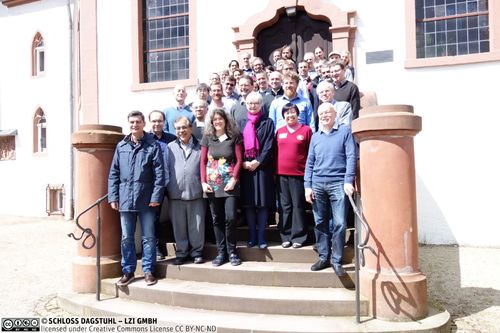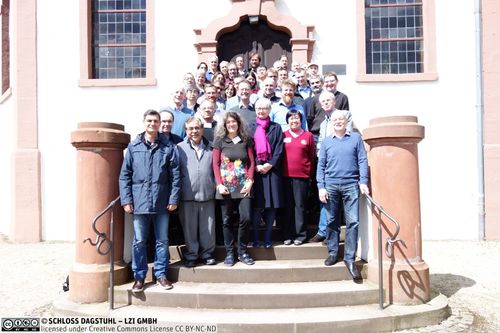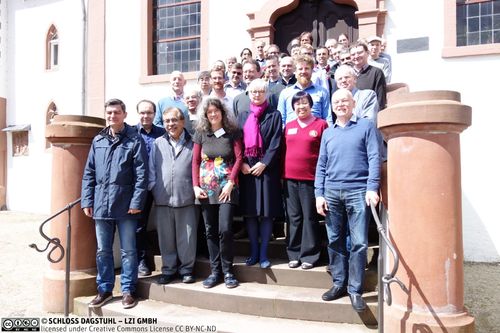Dagstuhl-Seminar 16171
Algorithmic Methods for Optimization in Public Transport
( 24. Apr – 29. Apr, 2016 )
Permalink
Organisatoren
- Leo G. Kroon (Erasmus University - Rotterdam, NL)
- Anita Schöbel (Universität Göttingen, DE)
- Dorothea Wagner (KIT - Karlsruher Institut für Technologie, DE)
Kontakt
- Andreas Dolzmann (für wissenschaftliche Fragen)
- Simone Schilke (für administrative Fragen)
Programm
Introduction
Public transport systems are highly complex systems, due to their technical and organizational complexity, and due to the large numbers of passengers that are transported each day. The quality of the services provided to the passengers is partly the result of the quality and robustness of the underlying plans, such as the line plan, the timetable and the vehicle and crew schedules. In addition, in real-time the quality of the service is the result of the interactions between the management of the public transport system and the information to and guidance of the passengers.
Both in the planning stage and in real-time, dealing with these problems requires handling large amounts of data, solving a sequence of complex combinatorial optimization problems, and dealing with uncertainty. Preferably, the optimization models aim to improve the robustness of the public transport system, so that the system is less vulnerable to disturbances.
Topics of the Dagstuhl Seminar
The seminar will cover topics that are related to the planning of public transport systems, and to their real-time operational management. Examples of the former are robustness and recoverability, and integration of the subsequent planning stages. Examples of the latter are real-time control, disruption management, and dynamic passenger information. The seminar will focus on handling large amounts of data, as well as on the application of quantitative models and algorithmic methods for solving the relevant problems in these problem areas.
Aims of the Dagstuhl Seminar
This seminar aims to bring together researchers from algorithm engineering, operations research, and combinatorial, stochastic and robust optimization. In addition, there will be researchers with an engineering background and participants from practice for presenting the current status quo in their areas. The aim of the Dagstuhl seminar is to foster and strengthen collaborations, both between researchers from different areas and between theory and practice, and to identify key research directions for the future. In particular, the organizers want to achieve the following goals:
- Develop an overview of the research that has been carried out in the mentioned areas that is relevant for public transport.
- Define the relevant challenges for further research in public transport. These are the topics that need further investigation by the research community.
- Define relevant optimization models and algorithms that can be used for tackling the indicated challenges.
- Identify scientific opportunities and challenges due to the availability of huge amounts of Big Data in public transport.
Public transport systems are highly complex systems, due to their technical and organizational complexity, and due to the large numbers of passengers that are transported each day. The quality of the services provided to the passengers is on the one hand the result of the quality and robustness of the underlying plans, such as the timetable and the vehicle and crew schedules. On the other hand, in real-time the quality of the service is the result of the complex interactions between the real-time logistic management of the public transport system and the information to and guidance of the passengers.
Both in the planning stage and in real-time, dealing with these problems requires handling large amounts of data, solving complex combinatorial optimization problems, and dealing with uncertainty. Preferably, the optimization models aim to improve the robustness of the public transport system, so that the system is less vulnerable to disturbances.
In addition, due to the use of smart cards and smart phones, it becomes technically possible to give personalized real-time traffic advice for passengers to guide them to their destinations, even in disturbed situations. In addition, the use of these devices makes huge amount of data available, which can improve decisions in real-time control and in disruption management as well as in the planning stage.
In this seminar, researchers from algorithm engineering and operations research worked together with researchers with an engineering background and participants from practice. The common goal was to improve methods for planning and scheduling of public transportation.
Among others, some specific topic which were covered were
- Scheduling of public transport. Several new applications and new ideas on algorithms for public transport scheduling were presented.
- Integration of planning stages. Suggestions were developed on how the traditional approach of sequential planning can be replaced by integrated approaches.
- Robustness and recoverability. Here several talks discussed methods on how to react to different kinds of disturbances, or how to make schedules more robust.
- Real-time control. Real-time control measures which can be taken to get back to the plan as soon as possible were proposed and discussed.
- Routing in public transport. For the important issue of routing passengers in public transport, also needed for timetable information systems, several algorithms and new approaches were presented and discussed.
- Applications and case studies. Among others the situation in Mumbai, India, was presented and discussed and representatives of several public transport operators sketched the planning process in their companies and pointed out open questions for further research.
- Future technologies were another important issue. The participants discussed the potential of new technologies and identified algorithmic challenges for their future utilization.
The seminar started with an introductory round in which every participant presented him- or herself with three slides. It was a good start to get to know each other. In the following days, nearly all participants contributed with talks. There were also two panel discussions, one with the other Dagstuhl group on learning algorithms, and another one on future technologies. The participants discussed and identified challenging algorithmic problems in this field.
Finally, the organizers would like to thank the Dagstuhl team and all the participants for a fruitful and successful seminar.
Leo Kroon, the main organizer of this Dagstuhl seminar, died unexpectedly on 14 September 2016. We are shocked and very sad about his sudden death. Leo was a great scientist and a wonderful person. We will never forget him.
 Leo G. Kroon, Anita Schöbel, and Dorothea Wagner
Leo G. Kroon, Anita Schöbel, and Dorothea Wagner
- Ralf Borndörfer (Konrad-Zuse-Zentrum - Berlin, DE) [dblp]
- Valentina Cacchiani (University of Bologna, IT) [dblp]
- Francesco Corman (TU Delft, NL) [dblp]
- David De Almeida (SNCF - Paris, FR) [dblp]
- Markus Friedrich (Universität Stuttgart, DE) [dblp]
- Marc Goerigk (Lancaster University, GB) [dblp]
- Rob Goverde (TU Delft, NL) [dblp]
- Jonas Harbering (Universität Göttingen, DE) [dblp]
- Mark Hickman (The University of Queensland, AU) [dblp]
- Dennis Huisman (Erasmus University - Rotterdam, NL) [dblp]
- Giuseppe F. Italiano (University of Rome "Tor Vergata", IT) [dblp]
- Natalia Kliewer (FU Berlin, DE) [dblp]
- Leo G. Kroon (Erasmus University - Rotterdam, NL) [dblp]
- Allan Larsen (Technical University of Denmark - Lyngby, DK) [dblp]
- Jesper Larsen (Technical University of Denmark - Lyngby, DK) [dblp]
- Marco Laumanns (IBM Research Zurich, CH) [dblp]
- Janny Leung (The Chinese University of Hong Kong, HK) [dblp]
- Marco Lübbecke (RWTH Aachen, DE) [dblp]
- Carlo Mannino (SINTEF ICT - Oslo, NO) [dblp]
- Gabor Maroti (VU University Amsterdam, NL) [dblp]
- Lingyun Meng (Beijing Jiaotong University, CN) [dblp]
- Juan Antonio Mesa (University of Sevilla, ES) [dblp]
- Matus Mihalak (Maastricht University, NL) [dblp]
- Pitu Mirchandani (Arizona State University - Tempe, US) [dblp]
- Rolf H. Möhring (TU Berlin, DE) [dblp]
- Matthias Müller-Hannemann (Martin-Luther-Universität Halle-Wittenberg, DE) [dblp]
- Karl Nachtigall (TU Dresden, DE) [dblp]
- Morten Nyhave Nielsen (DSB - Copenhagen, DK) [dblp]
- Dario Pacciarelli (University of Rome III, IT) [dblp]
- Thomas Pajor (Cupertino, US) [dblp]
- Narayan Rangaraj (Indian Institute of Technology - Mumbai, IN) [dblp]
- Marcella Sama (University of Rome III, IT) [dblp]
- Anita Schöbel (Universität Göttingen, DE) [dblp]
- Leena Suhl (Universität Paderborn, DE) [dblp]
- Norio Tomii (Chiba Institute of Technology, JP) [dblp]
- Johanna Törnquist Krasemann (Blekinge Institute of Technology - Karlskrona, SE) [dblp]
- Lucas Veelenturf (TU Eindhoven, NL) [dblp]
- Dorothea Wagner (KIT - Karlsruher Institut für Technologie, DE) [dblp]
- Christos Zaroliagis (CTI & University of Patras, GR) [dblp]
Verwandte Seminare
- Dagstuhl-Seminar 04261: Algorithmic Methods for Railway Optimization (2004-06-20 - 2004-06-25) (Details)
Klassifikation
- modelling / simulation
- networks
- optimization / scheduling
Schlagworte
- Public transportation
- Timetabling
- Resource scheduling
- Delay and disruption management
- Dynamic passenger information




 Creative Commons BY 3.0 Unported license
Creative Commons BY 3.0 Unported license
